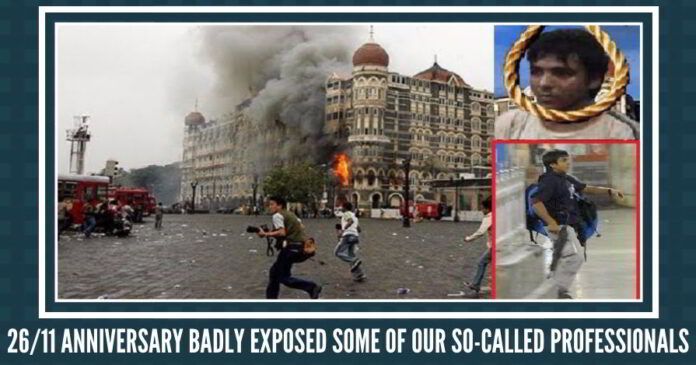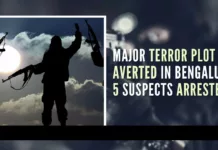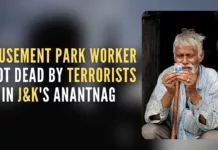
Kasab proved to be colossal time-wasting and also landed us in huge legal and biryani expenses—another outcome of being unprofessional. And of being a “soft State” shall we say?
First, a basic question to our professional historian’s media people and politicians: Why are they sticking to the designation given by the USA to that horrendous crime in New York when its twin towers were bombed from the air in 2001? For some queer reason, the American never added the calendar year to that crime, adhering merely to 9/11. Why are we now glued top 26/11 even on its 10th anniversary? Are we getting ready to pose, in a decade and more from now, the question in our school children’s history examination paper: “In which year did 9/11 occur?”
Even as Memon was blabbering the above, the female Republic TV anchor did not tell him that it was Yogi Adityanath, and not Prime Minister Modi, who had mentioned the biryani versus bullet difference
Anyway, the other day, on the 10th anniversary of that gruesome crime in Mumbai, a female anchor of the popular Republic TV put out a video clip of Yogi Aditynath, chief minister of UP, telling his audience that earlier the Congress were feeding biryani to terrorists while the Modi Government was now feeding bullets to the infiltrators from outside India. Even as she had done with that video clip, she asked, on phone, the reaction of Majeed Memon, a senior criminal lawyer, who is a Member of Parliament of the NCP (National Congress Party of Sharad Pawar) as to what he thought of the Yogi.
Memon immediately started his oral machine gun firing. What he said went like this: “The Prime Minister, you see, doesn’t understand these things. We treated Ajmal Kasab (the loose cannon from Pakistan who was arrested in Mumbai during the 26/11/08 event) well in jail, and to say that we fed him biryani is nonsense. In fact, India raised the level of administration of justice to a new high by giving Kasab him legal aid through a qualified lawyer.”
Even as Memon was blabbering the above, the female Republic TV anchor did not tell him that it was Yogi Adityanath, and notPrime Minister Modi, who had mentioned the biryani versus bullet difference. It was obvious that Memon had not been enabled to see who was speaking in the adjoining TV window. The TV Producer/Director in-charge failed to instruct the anchor to correct what Memon was saying. All of it was unprofessional but unfortunately left Memon to look foolish in identifying Yogi Adityanath as the Prime Minister.
The controversial point was whether he was “an enemy” considering that his Pakistan nationality was not fully established in that critical time that Mumbai police captured him or even thereafter
But what was most unprofessional was Memon’s reference to “our judiciary raising the level of its administrative system by giving legal aid to Kasab.”
Let’s go into that kudos showered by lawyer Memon explain.
The idea of giving legal aid to Ajmal Kasab (the only terrorist of 26/11/08) emerged from K.G.Balakrishnan, the then Chief Justice of India (CJI). That came to light in a report of “The Times of India”, Mumbai Edition, dated 30 December 2008.
That newspaper clipping (which is still with me) says that the then CJI (speaking to the newspaper from Israel), was a firm believer in Article 22 of our Constitution which provides that “no arrested person shall be denied the right to consult and to defended by a legal practitioner of his choice”. To fulfil this, the CJI said that the trial court would do well to appoint a lawyer to defend Kasab.”
But, ah, what exactly does Article 22 say? Here below is its full text:
(1) “No person shall be detained in custody without being informed, as soon as may be, of the grounds for such arrest nor shall he be denied the right to consult, and to be defended by, a legal practitioner of his choice.
(2) Every person who is arrested and detained in custody shall be produced before the nearest magistrate within a period of twenty-four hours of such arrest excluding the time necessary for the journey from the place of arrest to the court of the magistrate and no such person shall be detained in custody beyond the said period without the authority of a magistrate.
(3) Nothing in clauses (1) and (2)shall apply—
- to any person who for the time being is an enemy alien; or
- to any person who is arrested or detained under any law providing for preventive detention.”
Article 22 has four more clauses (with sub-clauses) but none of them over-rides Clause 3 and its two sub-clauses. Hence, the issue that arises as to why the then CJI thought that Ajmal Kasab was not an “enemy alien.” And therefore entitled to consult and be defended in our Courts by a legal practitioner; in other words, why should he have mandated and mandated legal aid for Kasab.
This writer understands that there is an international document that defines the phrase “enemy alien”: It may be so, but Article 22 does not define it in Article 22, does it?
If one goes by commonsense, Kasab was indeed an enemy who had been seen by witnesses while he killed several civilians; he was also guilty under the Arms Act by virtue of the guns and bombs which he was carrying. Yes, he was guilty of a criminal act, undoubtedly.
The controversial point was whether he was “an enemy” considering that his Pakistan nationality was not fully established in that critical time that Mumbai police captured him or even thereafter.
Considering the above firm facts, Justice K.G.Balakrishnan must, sadly, be considered as blindfolded while the Kasab trial took place in Mumbai from January 13, 2009, till March 31, 2010, while the CJI retired on May 12, 2010.
The point often missed in the debate on the thick veil over his nationality was the CJI’s and entire India’s argumentative nature embedded in their DNA.
Consider the fact that our then President, Pranab Mukherjee believed that our Mumbai police had provided evidence of Kasab’s Pak nationality and that Pakistan should act accordingly. (Citation 44 in https://en.wikipedia.org/wiki/Ajmal_Kasab. More importantly,
Former Pakistan Prime Minister, Nawaz Sharif confirmed that Kasab was from Faridkot village in Pakistan, and criticised President Zardari for cordoning off the village and not allowing his parents to meet anyone. (“The Hindu”, Chennai, 19 December 2008). Further, while the government of Pakistan initially denied that Kasab was a Pakistani citizen, but, in January 2009, it confirmed his citizenship.“Ajmal’s Nationality Confirmed”. (“The Dawn” newspaper of Pakistan, 8 January 2009).
Considering the above firm facts, Justice K.G.Balakrishnan must, sadly, be considered as blindfolded while the Kasab trial took place in Mumbai from January 13, 2009, till March 31, 2010, while the CJI retired on May 12, 2010.
There is one defence of then CJI’s advice to the Indian State about giving legal aid to Kasab. He told “The Times of India” in the previously cited report that “Someone should represent him (Kasab). He cannot go unrepresented during his trial in the courts. If he does, then under our justice delivery system, it would be regarded as a vitiated trial.” Now, tell me readers, which Indian of 26/11/08 would have been so saturated with the “human rights disease”, so foolish and so anti-patriotic as to call the conviction and hanging of Kasab as ‘vitiated”?
Instead, giving legal aid to Kasab proved to be colossal time-wasting from 26/11/08 till 21/11/12 when he was hanged. It also landed us in huge legal and biryani expenses—another outcome of being unprofessional. And of being a “soft State” shall we say?
Note:
1. Text in Blue points to additional data on the topic.
2. The views expressed here are those of the author and do not necessarily represent or reflect the views of PGurus.
- To Editors’ Guild; May we also have our say… please? - July 17, 2019
- Farooq Sahab is either down with dementia or he is a congenital liar? - July 8, 2019
- Shah Bano, Muslims in gutter &Zakaria’s secularism - June 30, 2019











Mr. Lavkare ‘s forensic strikes hit the targets and enlighten the Reader to discern facts from propaganda . He has exposed the vain foggy propaganda machine which used enormous time , expense and National resources and engaged Nation’s time , with little gain .
I wish Mr. Lavkare’s Pen more might to slay trash . I wish him long life .
Today many Judges don’t put their foot down to crush frivolous cases. This is one such case. You cannot do justice for all. If one side is right then the other side definitely wrong. But many Judges today are adopting a stand “if one for you” then here is “another for you”. This is a bad trend and the decision to provide kasab with legal aid is one such act. Unfortunately this trend has caught up with the Judiciary.
This alien enemy Ajmal kasab ate Biriyaani stomach full, at Indian tax payers money even during Ramjan month. I do not hold the then CJI of Supreme Court K G Balakrishnan as an eminent jurist. He was a third rate judge and thoroughly corrupt, he escaped from all corruption related investigations, taking shelter under SC/ST Commission. It was most unfortunate that he was elevated to SC as Judge due to insistence of the then President K R Narayanan during Vajpayee era. Unduly, Extra Judicial Human Rights waala Judge !?, which he failed to show to many unfortunate Indian under trial prisoners who are / were languishing in cramped & congested Indian Jails awaiting completion of trials and endured / suffered / undergone more jail sentence, than the law contemplated.